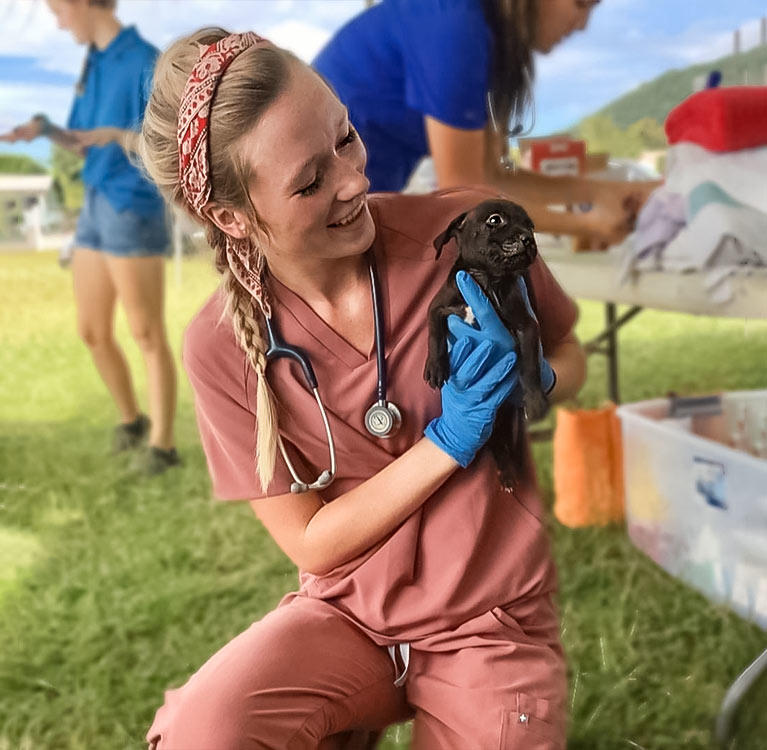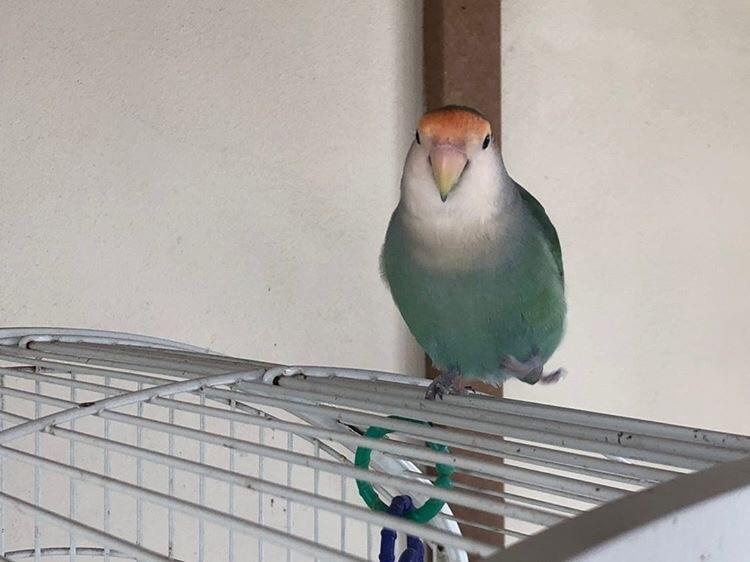If you are a veterinary student (or perhaps a prospective student), you probably know that the final year of veterinary school involves veterinary clinical rotations. This can be both an exciting and nerve-racking time of transition as you start to learn more about the veterinary clinic experience. Your veterinary school—such as Ross University School of Veterinary Medicine—has prepared you with preclinical curriculum classes, but it is always helpful to have a few hints at success beforehand. Keep reading for tips on how not only to survive but to excel in your clinical year.
HOW TO EXCEL DURING YOUR CLINICAL ROTATIONS
The veterinary clinic experience can be intimidating, but rest assured, your education thus far has prepared you for the challenges that arise during your veterinary clinical rotations. At Ross Vet veterinary clinical rotations last 45 weeks, during this time you will work alongside practicing doctors of veterinary medicine. With their guidance and instruction, you will examine, diagnose, and treat real patients. At last, this is your opportunity to apply your accumulated animal experience for vet school—indeed all your veterinary knowledge up to this point—and gain invaluable real-world experience.
Excelling in clinical rotations takes a balance of time-management skills, self-care, and a willingness to continue learning. It’s inevitable that part of the veterinary clinic experience involves difficult cases, tricky situations, and even working with new species. If you maintain an open mind and a “can do” attitude, you can excel in your veterinary clinical rotations.
Remember, this is your time to gain the skills and confidence necessary to begin your first year as a veterinarian. Enjoy learning and soak up the new knowledge you receive during the veterinary clinic experience. At Ross Vet each clinical rotation lasts two to four weeks and includes working with a variety of animal species. You are graded for each rotation, but not through the written examinations common to your early years of vet school. Your grades are based more on the application of knowledge, on professionalism, and on your willingness to learn.
To get the most out of your experience, check out our six best tips for clinical rotation success.
CLINICAL YEAR OF VET SCHOOL TIPS
1. Speak up!
Are you the type of student who hesitates to ask or answer questions in class? Now is the time to step out of your comfort zone. Ask questions, be inquisitive and curious and unafraid to admit that you don’t know something. And if the clinician asks a question that you know the answer to, speak up! If you don’t know the answer, however, promise that you will study to find out the answer and report back to them the following day. This shows that you are willing to take the initiative to learn and make the most out of your veterinary clinic experience.
2. Take notes
Just because you are no longer sitting in lectures doesn’t mean it’s time to stop taking notes. Carry around a small notebook to take notes during rounds and jot down notes on your cases. Not only will this facilitate learning, but you will have a personal reference that you can continue using—and adding to—during your career as a veterinarian.
3. Approach cases like you are the veterinarian
Clinical rotations are your chance to hone your knowledge and skills to be practice-ready while you are also protected by the security net of professional supervision. You have all the tools in your toolbox, and it’s time to put them to work: be the veterinarian.
Approach cases as though you are the doctor and think to yourself, “what would I do if I was responsible for this case?” or “how would I approach this difficult situation with this owner?” Soon enough, you will be the one calling the shots, so this can be an excellent exercise to gain confidence in handling primary case responsibilities.
4. Push the envelope: Be a “yes” person
Feeling a little nervous about emergency and critical care cases? Not a huge fan of large animal medicine? Clinical rotations are the ideal opportunity to challenge yourself with things that might intimidate you. Your clinicians want to see that you’re able to overcome doubts and nerves: step out of your comfort zone, give your best effort, and thrive.
One sure way to excel in clinical rotations is to be a “yes” person. Let’s say that a critical emergency comes in during your emergency and critical care rotation. You don’t want to be the person sitting in the shadows waiting for another student to volunteer for the case. If the surgeon on your small animal surgery rotation offers you the drill and asks if you’d like to try drilling a bone plate, your answer should be an emphatic “yes!”—no matter how nervous you might feel.
Clinical year is an incredible time of opportunity to gain exposure to complex cases. By volunteering to help in such cases, you’ll learn many things to help you become a better veterinarian while making a great impression on your clinicians and fellow students, too.
5. Don’t neglect self-care
You want to show initiative and excel in your veterinary clinical rotations, but you must also remember to take care of yourself. Days in clinical rotations may be long, so proper self-care is essential for success.
Remember to prepare and pack nutritious meals and snacks to take with you to provide sustenance throughout the day. Pack a water bottle and remember to take water breaks to stay hydrated. Try to get at least seven hours of sleep each night—a crucial factor to improve performance and maintain mental health. Don’t sacrifice all your time to your clinical rotations, and remember to continue doing things beyond school that bring you tranquility and happiness.
There are nine dimensions to personal wellbeing, so self-care is unique to each person. If you are having a tough time on one of your rotations, say something. Tell the clinicians that you’re struggling, and don’t be afraid to ask for help. You are not alone, and it’s likely that other students are struggling with the same things you are. The clinicians are there to help you learn and become the best veterinarian possible. If you think you might be struggling with your mental health, know that you are not alone. It’s okay to explore resources to find help.
6. Have fun
Clinical rotations can be challenging, but the rewards—knowledge, skill, confidence, and a sense of accomplishment—far surpass those challenges. Remember why you wanted to become a veterinarian, and embrace this time to apply and advance your knowledge and clinical skills. If you’re like most veterinary students, you have dreamed of becoming a veterinarian for quite a long time. Remember that you’re getting close to the finish line, and don’t forget to have fun while continuing to learn!
TRANSITIONING TO CLINICAL YEAR
Now that you’re armed with a veterinary school education and these six tips for clinical rotation success, you’re ready to excel in your clinical year. Before you know it, you will achieve your dream and graduate with your doctor of veterinary medicine (DVM) degree.
Ross University School of Veterinary Medicine is committed to helping veterinary students succeed in their clinical studies and throughout their veterinary career. If you are already a veterinary student, learn about the Ross Vet clinical year and consider the possibilities. If you are a prospective veterinary student, request more information or apply to Ross Vet today.
Related Resources:






